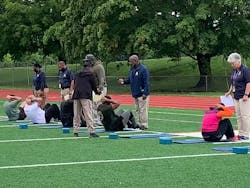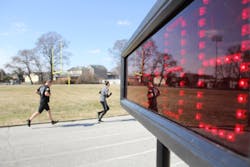Creative Recruit Pursuits: How PDs Are Attracting Officers
The billboard went up near City Hall in mid-March. The centerpiece of the sign included two female police officers framed by high rises. “Join Us In Louisville Laterals Welcome” the billboard’s police recruitment pitch proclaimed in white and yellow letters.
Except the billboard’s location wasn’t Louisville or a surrounding Kentucky community. It was in Atlanta, and one of the women featured on it was the city’s former police chief, Erica Shields, who is Louisville’s current chief.
“The pay that she’s putting out there for laterals, these guys are going to get a raise if they go there,” Lt. Kevin Knapp, president of the city’s police union, told told the Atlanta Journal-Constitution, adding that the Louisville Police Department was offering an $8,000 hiring bonus and $3,000 to relocate. “I don’t know if she’s got billboards in other cities, but I’m not surprised that she would start here. The people that work here enjoyed working for her.”
Not so long ago, such a tactic to attract job applicants might be considered rare or an outlier. But as departments compete with each other to recruit officers from a candidate pool that has shrunk over the past few years, some agencies are trying aggressive and creative approaches to fill their ranks.
“We’re getting more creative with our approaches,” says Capt. Paul Hrebenak, the director of Police Officer Employment Opportunities in the Recruiting Division of the Metropolitan Police Department in Washington, D.C. “If you go to a job fair... are you really attracting or missing a segment of the population?”
Like the Louisville Police Department, D.C. Metro has taken its recruitment advertising on the road. In New York City, signs have begun popping up in subway cars earlier this year. Unlike Louisville, though, these ads target an unorthodox group of potential applicants.“Join Us,” read the mass transit signage, which also displays a D.C. Metro insignia. “Gamers • Foodies • Techies • Influencers.”
“That’s why you may have seen our ads in the New York subways... The idea is we’re going to value your whole person,” says Hrebenak. “I think that message resonates with a younger generation.”
That tailored, focused strategy is part of an effort to appeal to a younger generation of potential officers who might have different views about careers—law enforcement or otherwise—than past generations.
“We’re seeing our workforce is not so single-minded,” says Hrebenak. “Even my generation—which I’m Generation X—and generations before me, there was this kind of mindset that you go to school for what you want to do, then you leave and join a place and work there until you retire. If you’re in law enforcement, maybe I switch agencies once or twice in my career, that’s it.
I’m a police officer. Now we’re seeing people come to law enforcement from other careers.”
And it appears these measures are getting results.
“I think the response has been positive,” he says. “We’re seen an increase of people coming down from the New York and New Jersey area... We’ve also seen (more) women applicants.”
Hunting—or what some might call poaching—for candidates in other jurisdictions might be fraught with bad feelings and backlash. But Hrebenak hasn’t seen a detrimental effect.
“It’s not like the Sharks and the Jets from West Side Story. We’re not snapping our fingers at each other,” he says. “I think everyone knows how hard it is to recruit... There might be some ill-will, but I don’t think it’s anything that would cause a rift between agencies.”
The Baltimore County Police Department also has set its sights on possible candidates who might not fit the traditional picture of a law enforcement officer, says Capt. Paul G. Borowski, who has been the department’s commander of employment since 2018. In the past, the agency would have focused primarily on candidates set on a career in law enforcement, the kind of candidates already likely to apply for openings. But with the current limited applicant pool, Borowski said the department is trying to raise awareness of job opportunities among individuals who might still be deciding on a career path.One of the department’s aggressive approaches to lure candidates is a financial one. A new Baltimore County Police Department hire can now expect a generous $10,000 signing bonus and $3,000 to relocate. And Borowski says he’s seen two benefits from the bonus: It gets applicants in the door, and it keeps them motivated throughout the process.
“The academy class we have in there now is the first class that will be the recipient of the bonus, which happened to be our largest academy class since 2007,” says Borowski, who adds the goal is to bring staffing back up to 2012 and 2013 levels. “We’re proud of it because we don’t know specifically, outside of taking a survey, if that hiring bonus motivated each and every one of them to sign up—I’m going to say it didn’t—but it definitely motivated some of them.”
A new hiring landscape
Before 2020, departments around the country were already struggling to fill staffing shortages. That was exacerbated during the pandemic, especially as public sentiment concerning police and law enforcement turned following the death of George Floyd. But the pandemic’s effects haven’t simply disrupted the law enforcement job market, it radically transformed the country’s entire job market.
Historically, police departments had truly only competed with other public safety agencies when it came to job candidates. Because of where their agencies are located on the Eastern Seaboard, Borowski and Hrebenak admit that their organizations have competed with other departments in the surrounding area for officers. In the current pandemic employment landscape, however, industries across the board are struggling to fill positions, and that has expanded the job options for candidates on the market, says Borowski.
“We’re not just competing with other police departments, we’re competing with just about every other private sector job that has openings as well,” he says. “Because it seems like everywhere it’s ‘help wanted,’ and we’re no different. We need to fill our ranks.”
“It’s just a different labor market for everybody, not just for law enforcement... Every field is having issues with staffing and hiring,” adds Hrebenak. “It’s become acute for a lot of departments who may have had a hiring freeze and now are trying to ramp up hiring. It’s caused everyone to look at how we engage and how we get people.”
Both police recruiters are quick to push back against criticism that deepening the candidate pool to fill desperately needed positions leads to lower standards. While standards might change and evolve, the duties of a police officer are too critical to allow for standards to be diminished, says Borowski.
Tooting your own horn
Out-of-town ads and generous hiring bonuses are the types of moves that can garner attention and headlines. But Hrebenak and Borowski point to smaller, less-flashier efforts as being essential to driving their departments’ recruitment engines. For instance, using social media and other platforms to take control of their agencies’ narratives and not hiding the lights of their accomplishments and achievements under bushels.“I think the humble brag has always been a part of (recruiting). You have to sell your department,” says Hrebenak. “But you have to refocus on how we’re doing that selling.”
Pulling back the curtain for the public also has allowed the Baltimore County Police Department to show a different side of itself to potential applicants by shining a spotlight on career opportunities that extend past simply working on patrol, says Borowski. He points to the head of the department’s helicopter division, who joined at 18 without previous aviation experience and worked his way to running the unit.
Another way they’ve tried to reach previously underserved groups of potential candidates has been through the return of community events. At the height of the pandemic, in-person events were shut down, closing off an opportunity for departments to tell their story in a relaxed setting. As the country begun to fully open again, Hrebenak says they’ve been eager to sponsor events.
Last year, the department held four community events, and this year six events have been scheduled, with one set for May. “I don’t think job fairs are where it’s at now, and these community events are a better bang for your buck,” he says.
Borowski says returning to face-to-face interactions with a possible future Baltimore County police officer plays to his strengths when it comes to selling the department he’s proud to serve on. “I can put a recruitment spin on anything.”
‘Be human’
As disruptive as the past few years have been, the change in law enforcement hiring has reinforced a philosophy that Hrebenak says is essential for any recruiter: always be reviewing your process and don’t be afraid to adapt. Staff shortages might be the current mother of employment invention, but practicing continual assessment even during flush times gives an agency a better chance of saying head of hiring curves instead of playing catch-up from behind.
“For a long time we’ve had the idea that people would be beating down our doors, and we’d have more applicants than we needed,” he says. “We’re not necessarily seeing people not come to MPD because they want to go to Montgomery County or (Prince George’s) County. We’re seeing people saying it’s not that I don’t want to be a police officer, it’s just that I got an offer from a financial firm to work for them that’s more money and I want to try that out first. That’s a different dynamic than we’ve ever had in the past with hiring.”
One of the biggest pieces of advice Borowski gives police recruiters could apply to any person tasked with drawing talented people to an organization.
“Be human, I say that in every part of our job we’re human beings, and if you treat applicants like human beings, as simple as talking to someone, making an initial contact by phone to hear a voice, that has been so beneficial to us because we get into a rut of we’ve got a hundred applicants, let’s send them a boilerplate email. But think of the value of being that applicant and getting a phone call from someone from the police department. Then you start to buy into the fact that maybe I want to go to this department.”




